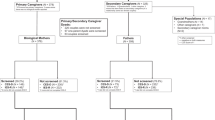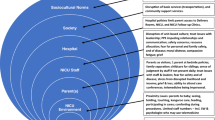Abstract
Emotional disorders in parents of infants admitted to the neonatal intensive care unit (NICU) carry the potential for serious ramifications in neonatal and childhood outcomes. Despite this, current NICU mental health supports are less than optimum; postpartum mental health screening is limited, often missed in parents of inpatient infants, and may not be applicable to all family structures. Current evidence demonstrates improved outcomes in neonates and family members with early identification and multidisciplinary approaches to managing mental health problems. Physician Associates/Assistants (PAs) are a skilled group of advanced practice providers who are often a point of first contact for parents in the NICU, helping maintain continuity of care. In this perspective, we underscore leveraging the skills of PAs to promote the emotional wellbeing of parents in the NICU by way of practice and policy involvement. We also included a generic set of recommendations to equip PAs in this role.
This is a preview of subscription content, access via your institution
Access options
Subscribe to this journal
Receive 12 print issues and online access
$259.00 per year
only $21.58 per issue
Buy this article
- Purchase on Springer Link
- Instant access to full article PDF
Prices may be subject to local taxes which are calculated during checkout
Similar content being viewed by others
References
Philip AGS. The evolution of neonatology. Pediatr Res. 2005;58:799–815.
Roque ATF, Lasiuk GC, Radünz V, Hegadoren K. Scoping review of the mental health of parents of infants in the NICU. J Obstet Gynecol Neonatal Nurs. 2017;46:576–87.
Harrison W, Goodman D. Epidemiologic trends in neonatal intensive care, 2007–2012. JAMA Pediatr. 2015;169:855–62.
Treyvaud K, Spittle A, Anderson PJ, O’Brien K. A multilayered approach is needed in the NICU to support parents after the preterm birth of their infant. Early Hum Dev. 2019;139:104838.
Bryant RA. Acute stress disorder as a predictor of posttraumatic stress disorder: a systematic review. J Clin Psychiatry. 2011;72:233–9.
Vanderbilt D, Bushley T, Young R, Frank DA. Acute posttraumatic stress symptoms among urban mothers with newborns in the neonatal intensive care unit: a preliminary study. J Dev Behav Pediatr. 2009;30:50–6.
Lefkowitz DS, Baxt C, Evans JR. Prevalence and correlates of posttraumatic stress and postpartum depression in parents of infants in the Neonatal Intensive Care Unit (NICU). J Clin Psychol Med Settings. 2010;17:230–7.
Jubinville J, Newburn-Cook C, Hegadoren K, Lacaze-Masmonteil T. Symptoms of acute stress disorder in mothers of premature infants. Adv Neonatal Care. 2012;12:246–53.
Shaw RJ, Deblois T, Ikuta L, Ginzburg K, Fleisher B, Koopman C. Acute stress disorder among parents of infants in the neonatal intensive care nursery. Psychosomatics. 2006;47:206–12.
Yehuda R, Hoge CW, McFarlane AC, Vermetten E, Lanius RA, Nievergelt CM, et al. Post-traumatic stress disorder. Nat Rev Dis Prim. 2015;1:15057.
Pedersen CB, Mors O, Bertelsen A, Waltoft BL, Agerbo E, McGrath JJ, et al. A comprehensive nationwide study of the incidence rate and lifetime risk for treated mental disorders. JAMA Psychiatry. 2014;71:573–81.
Kong LP, Cui Y, Qiu YF, Han SP, Yu ZB, Guo XR. Anxiety and depression in parents of sick neonates: a hospital-based study. J Clin Nurs. 2013;22:1163–72.
Somers JM, Goldner EM, Waraich P, Hsu L. Prevalence and incidence studies of anxiety disorders: a systematic review of the literature. Can J Psychiatry. 2006;51:100–13.
Korja R, Savonlahti E, Ahlqvist-Björkroth S, Stolt S, Haataja L, Lapinleimu H, et al. Maternal depression is associated with mother-infant interaction in preterm infants. Acta Paediatr. 2008;97:724–30.
Gerstein ED, Njoroge WFM, Paul RA, Smyser CD, Rogers CE. Maternal depression and stress in the neonatal intensive care unit: associations with mother-child interactions at age 5 years. J Am Acad Child Adolesc Psychiatry. 2019;58:350–8.
Grace SL, Evindar A, Stewart DE. The effect of postpartum depression on child cognitive development and behavior: a review and critical analysis of the literature. Arch Women’s Ment Health. 2003;6:263–74.
Hee Chung E, Chou J, Brown KA. Neurodevelopmental outcomes of preterm infants: a recent literature review. Transl Pediatr. 2020;9:S3–S8.
Lamere K, Golova N. Screening for postpartum depression during infant well child visits: a retrospective chart review. Clin Pediatr. 2022;61:699–706.
Lang E, Colquhoun H, LeBlanc JC, Riva JJ, Moore A, Traversy G, et al. Recommendation on instrument-based screening for depression during pregnancy and the postpartum period. CMAJ. 2022;194:E981–E989.
Hynan MT, Steinberg Z, Baker L, Cicco R, Geller PA, Lassen S, et al. Recommendations for mental health professionals in the NICU. J Perinatol. 2015;35:S14–8.
Johnson Rolfes J, Paulsen M. Protecting the infant-parent relationship: special emphasis on perinatal mood and anxiety disorder screening and treatment in neonatal intensive care unit parents. J Perinatol. 2022;42:815–8.
Abu Jawdeh EG, Hardin-Fanning F, Kinnard TB, Cunningham MD. Neonatal postgraduate training program for physician assistants: meeting a need in neonatal care. J Perinatol. 2019;39:746–53.
Epstein-Lubow G, Gaudiano BA, Hinckley M, Salloway S, Miller IW. Evidence for the validity of the American Medical Association’s caregiver self-assessment questionnaire as a screening measure for depression. J Am Geriatr Soc. 2010;58:387–8.
McAllister MS, Olagunju AT. Revisiting the unmet mental health needs in Canada: Can PAs be part of the solution? JAAPA. 2023;36:42–45.
Funding
There were no sources of funding or sponsorship received in relation to this work.
Author information
Authors and Affiliations
Contributions
BW conceptualized and drafted the original manuscript, and assisted with revision and manuscript submission. KS assisted with manuscript conceptualization and revision. KS assisted with manuscript conceptualization and revision. ATO conceptualized and assisted in drafting the original manuscript, and assisted with revision and completed manuscript submission. ATO supervised the entire project as the senior author. All authors approved the final manuscript as submitted and agree to be accountable for all aspects of the work.
Corresponding author
Ethics declarations
Competing interests
The authors declare no competing interests.
Additional information
Publisher’s note Springer Nature remains neutral with regard to jurisdictional claims in published maps and institutional affiliations.
Rights and permissions
Springer Nature or its licensor (e.g. a society or other partner) holds exclusive rights to this article under a publishing agreement with the author(s) or other rightsholder(s); author self-archiving of the accepted manuscript version of this article is solely governed by the terms of such publishing agreement and applicable law.
About this article
Cite this article
Wile, B., Skowronski, K., Shariati, K. et al. Promoting mental well-being among parents in the neonatal intensive care unit: a perspective on the role of Physician Associates. J Perinatol (2024). https://doi.org/10.1038/s41372-024-01936-0
Received:
Revised:
Accepted:
Published:
DOI: https://doi.org/10.1038/s41372-024-01936-0



